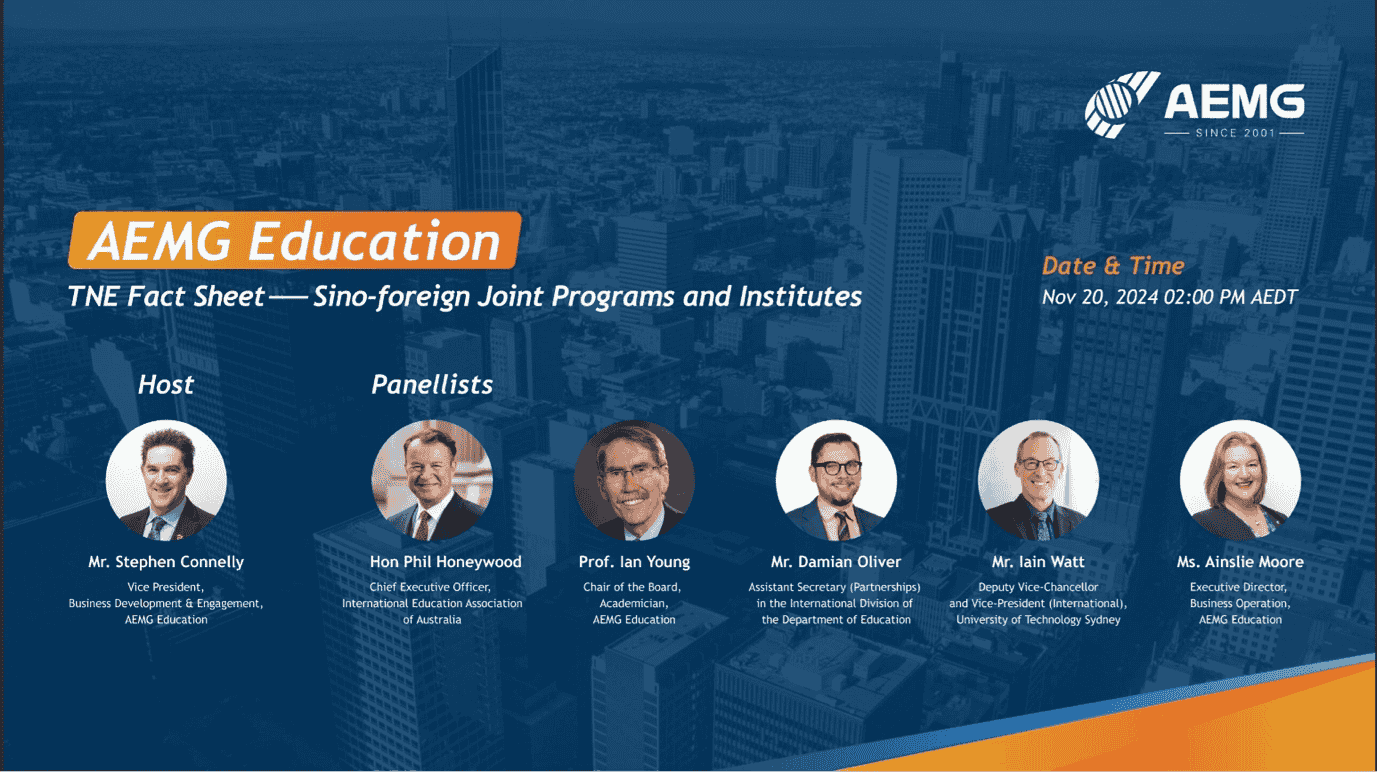November 22, 2024

On Wednesday 20th November, two webinars were hosted for Australian international education experts. The International Education Association of Australia (IEAA) hosted a webinar to discuss new Australian government policy on transnational education and international student enrolments. Immediately following, AEMG hosted a webinar for their Australian partner universities titled ” AEMG Education – TNE Fact Sheet: Sino-foreign Joint Programs and Institutes”. The webinar provided attendees with useful policy insights and commentary on the role of Sino-foreign joint programs in managing onshore international student commencements in a changing policy environment. The webinar attracted education experts, academic leaders, and policymakers from around Australia, focusing on how to sustain international education collaboration under the proposed new policy framework.
Guests and Key Discussions:
The IEAA webinar focused on the Australian government’s proposed enrolment policy and how Sino-foreign transnational education (TNE) programs can qualify for exemption. The webinar was moderated by Stephen Connelly, AEMG Vice President of Business Development and Engagement, and featured the following distinguished panellists:
- Hon. Phil Honeywood – CEO of the International Education Association of Australia (IEAA)
- Prof. Ian Young – Chair of AEMG Education Board
- Mr. Damian Oliver – Assistant Secretary for Partnerships, Department of Education
- Mr. Iain Watt – Deputy Vice Chancellor International, UTS
- Ms. Ainslie Moore – Executive Director, Business Operations, AEMG Education
Highlights: Policy Analysis and Future Prospects:
Policy Background and Challenges:
The Australian Department of Education announced that beginning in 2025, a national cap of 270,000 on new international student enrolments will be implemented. The policy will only be enacted if the legislation passes through parliamentary processes successfully. However, the Department of Education and institutions need to prepare for the possibility that the legislation is enacted.
Conditions for the TNE exemption: Panellist Damian Oliver provided a detailed explanation of the conditions for exemption, noting that TNE programs meeting the following criteria would be exempted from the enrolment cap:
- More than 60% of the joint program study duration must be completed offshore;
- Programs must be formally registered by the foreign government where the program is offered;
- The Australian university must provide teaching inputs to the students while they are studying in their home country.
The discussion confirmed that AEMG’s collaborative models between its Global and China Partner universities – the 2+2, 3+1, 3+1+1, 3+2, 1+1 and 1+1+1models – will be exempt from the potential enrolment cap.
Implementation Details and Future Support:
If the legislation passes through parliament successfully, the Australian Department of Education plans to introduce an automated exemption review system by mid-2025, significantly simplifying administrative processes and enabling transparency of Sino-foreign collaborations as exempt models.
A New Chapter in Educational Collaboration:
As emphasised throughout the AEMG webinar, the essence of educational collaboration lies not only in academic exchange, but also in cultural integration and shared value creation. Professor Ian Young stated:
“Education is not just about imparting knowledge; it’s about building bridges and providing students from diverse cultural backgrounds with rich learning experiences. Sino-foreign joint programs are vital pathways to achieving this goal.”
From Policy to Practice: Toward a Better Future:
This forum addressed the key policy questions and provided indicators for partner universities regarding actionable strategies for the future, including:
- Program Adaptability: Willingly adjust joint program models to account for evolving policy demands.
- Prioritising Student Experience: Further improve academic and personal support for students transitioning from domestic to international studies.
- Leveraging Technology: Utilise digital tools and platforms to streamline administrative processes and enhance the efficiency of cross-border education.
In her closing remarks, AEMG Executive Director Ainslie Moore stated:
“Policy changes are not obstacles but opportunities for adaptation and innovation. Through close collaboration with our partner universities, we aim to continue providing students with exceptional education while meeting evolving regulatory standards.”
Overall, AEMG’s webinar not only provided practical policy guidance for its partners but also demonstrated the resilience and adaptability of Sino-foreign joint programs in the face of policy changes. Looking ahead, AEMG will continue to lead in transnational education, driving innovation and helping more students achieve their global academic dreams.
Recent Posts
Subscribe Our Newsletter
Join our subscribers list to get the latest news and updates delivered directly in your inbox.
